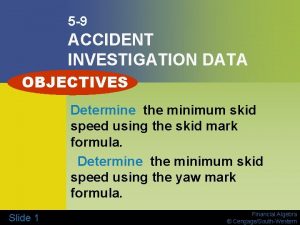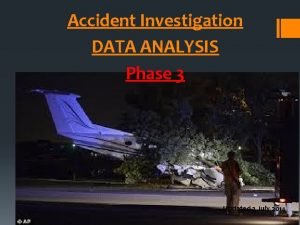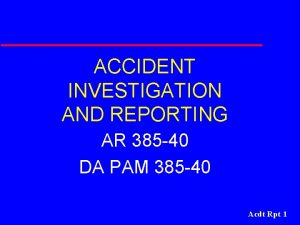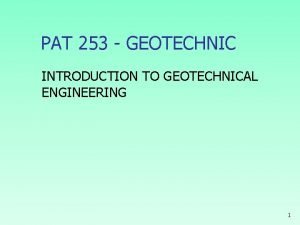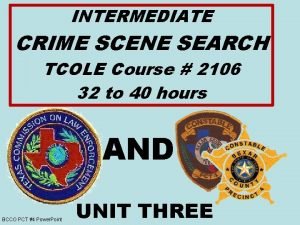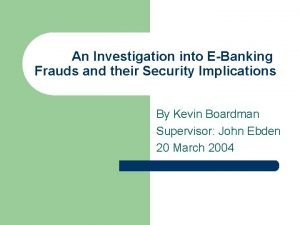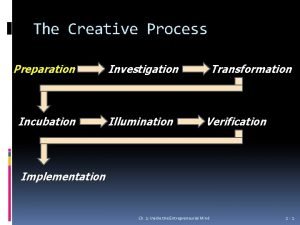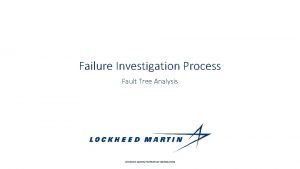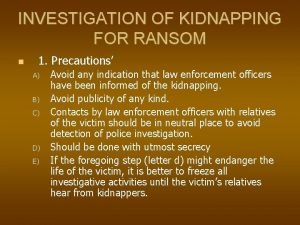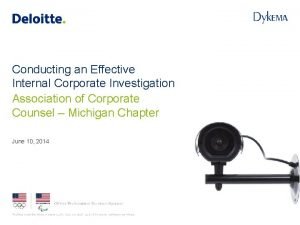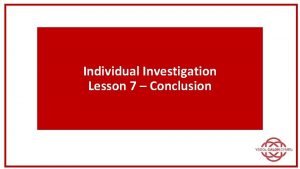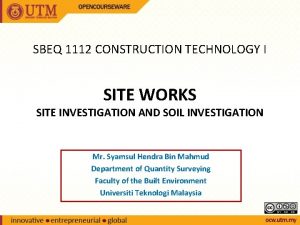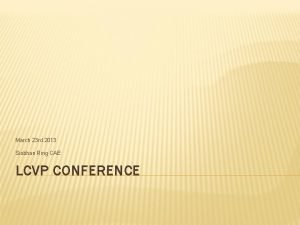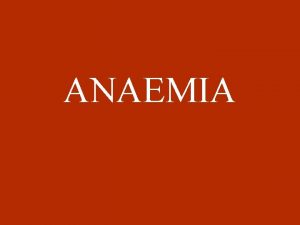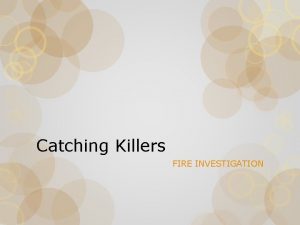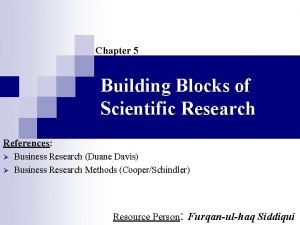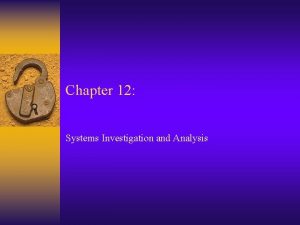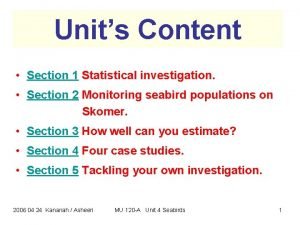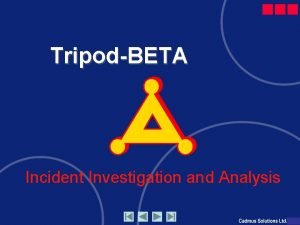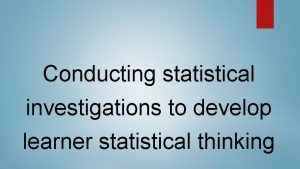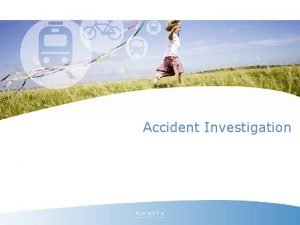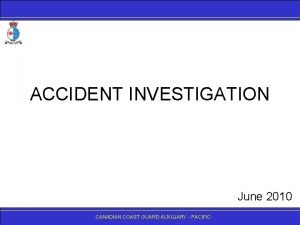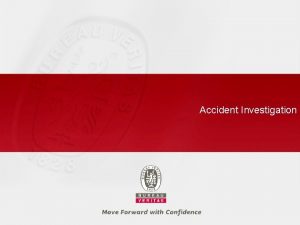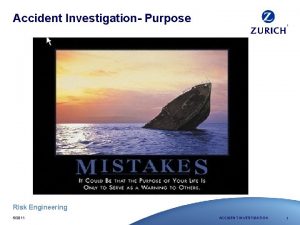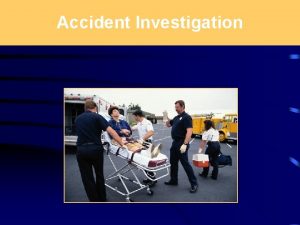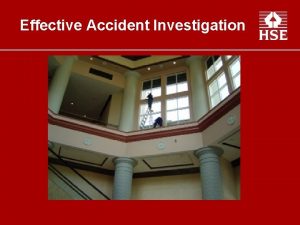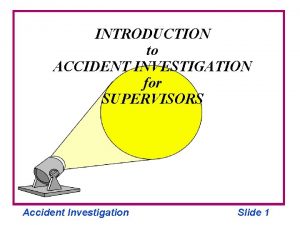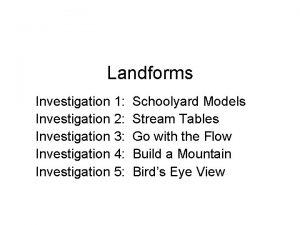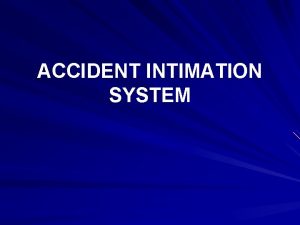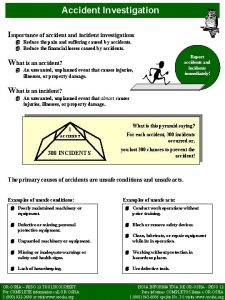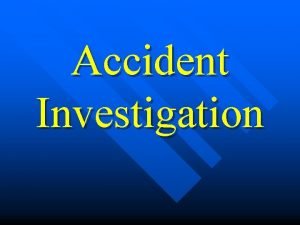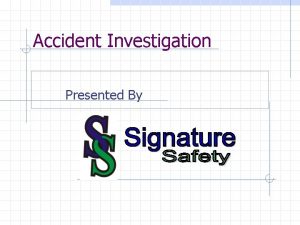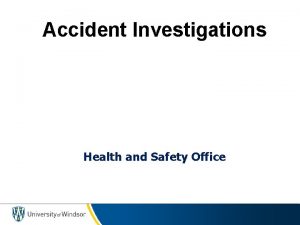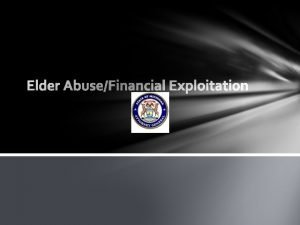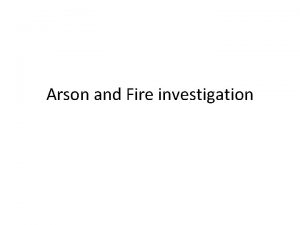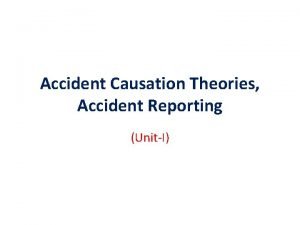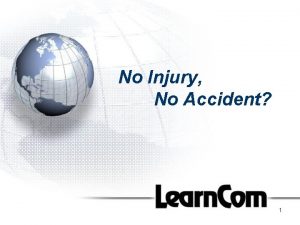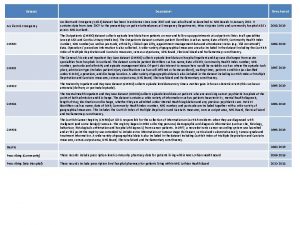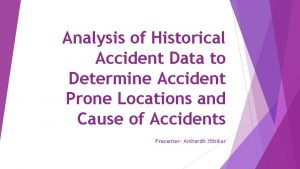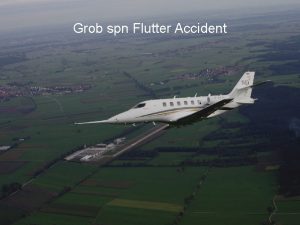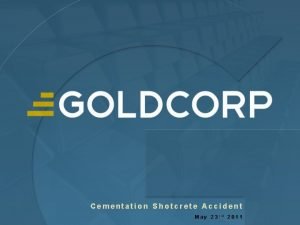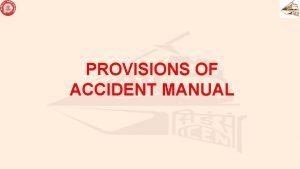Accident Investigation WHAT IS AN ACCIDENT What is





































- Slides: 37


Accident Investigation

WHAT IS AN ACCIDENT? • What is an accident? o Any unexpected event o Some may even be good • Does an accident always involve an injury? • Does an injury always involve an accident?

What Is An Accident?

Accidents • Accident o Any unplanned event that results in § Personal injury § Property damage


Accidents • Usual causes o Failure of people, equipment, supplies, or surroundings to behave or react as expected


WHY INVESTIGATE? • Why investigate? o To PREVENT injuries • Investigations should not be witch hunts o If results show need for discipline, fine But. . . o That is not the purpose

INVESTIGATIONS • Include non injury accidents incidents o Proactive o Preventative • Investigating only injuries o Reactive

INJURY PYRAMID Fatality Serious Recordable 1 st Aid Cases Non-injury Accidents

Incident Investigation Plan • Establish parameters • Be aware of other requirements o ADA, EEO, Union, etc. • Establish procedures • Develop forms • Train employees

First Report The “First Report of Injury” sent to Workers’ Compensation Company is NEITHER an accident report NOR an investigation.

Incident Report • Write an incident report o As soon as possible • Start with a supervisor’s report based on information provided by employees o “Employee said. . . ”

Injury Potential • Investigate based on POTENTIAL FOR INJURY • The greater the potential, the more thorough the investigation


The Investigation Avoid a “cold trail”

The Investigation • Be methodical • Gather as much information as possible o Throw out irrelevant information during the analysis step

The Investigation • Beware of preconceived conclusions • Beware of “jumping the gun” o Do not offer solutions before you find the basic cause

The Investigation • • • ASK QUESTIONS When you get an answer, ask “WHY” Then ask “WHY” again And AGAIN And “who? ”, “what? ”, and. . . ”why? ”

Basic Causes Indirect Causes Direct Causes Management Safety Policies & Decisions Personal Factors Environmental Factors Unsafe Act Unsafe Condition Unplanned Release of Energy and/or Hazardous Material Incident

The Investigation • Investigate the scene o Take measurements o Take pictures o Evaluate equipment o Be imaginative

The Investigation • Look for o o o o Guards off Lack of PPE Housekeeping issues Poor work practices Faulty equipment Inadequate training Poorly written procedures Etc.



The 4 “Ps” • • People Position Parts Paper

Interviews • • Interview employee involved Interview witnesses Interview other employees in area Look for similar incidents

Interviews • Explain the purpose of the investigation • • o Accident prevention Put at ease Let speak freely Take notes without distracting Only use a tape recorder with the person’s knowledge and consent. • Interview as soon as possible

Analysis Techniques • • • Change analysis Job Safety Analysis (JSA) Event and Causal Factors Analysis Multi linear Events Sequencing (MES) Project Evaluation Tree (PET) Combination

Report of Investigation • 1. Background information • 2. Detailed account of the incident • 3. Resolution • 4. Corrective actions

RESOLUTION • Discuss ways of preventing future incidents • Solicit ideas from employees & others • Be creative • Make recommendations

Corrective Actions • Corrective actions o Recommendations that are adopted • Inform and train employees and supervisors

Follow-Up • Involve supervisors & employees • Are solutions: o Used? o Effective? • Solicit feedback

Trend Analysis • Evaluate for incident, accident and injury trends in order to focus efforts • Use 300 forms, incident & accident reports, first aid logs, inspection reports, etc. • Analyze by entity, facility, time, job, etc. • Do at least a 3 year comparison

Resource • Ask for help from your workers’ compensation carrier


Sandra A. Mihalik, WSO-CST Safety & Health Specialist Montana Safety & Health Bureau Phone: 406. 444. 6418 E-mail: smihalik@mt. gov
 5-9 accident investigation data answers
5-9 accident investigation data answers Accident investigation data analysis
Accident investigation data analysis 385/40
385/40 Ggara
Ggara Subdatum points
Subdatum points 1982ahmad österreich
1982ahmad österreich Drug diversion investigation checklist
Drug diversion investigation checklist 2106 crime scene investigation
2106 crime scene investigation Phet charges and charged objects investigation
Phet charges and charged objects investigation Banking frauds investigation
Banking frauds investigation Transformation in creative process
Transformation in creative process Lockheed martin investigation
Lockheed martin investigation Kidnap for ransom investigation
Kidnap for ransom investigation Internal corporate investigation
Internal corporate investigation Individual investigation
Individual investigation Démarche d'investigation
Démarche d'investigation Soil investigation methods
Soil investigation methods Lcvp portfolio work experience diary sample
Lcvp portfolio work experience diary sample Megaloblastic anemia causes
Megaloblastic anemia causes Catching killers fire investigation
Catching killers fire investigation Security incident investigation
Security incident investigation Ycci scholar award
Ycci scholar award Forensic science foodborne outbreak investigation answers
Forensic science foodborne outbreak investigation answers 5 building blocks of investigation
5 building blocks of investigation What is system investigation
What is system investigation Career investigation fccla
Career investigation fccla Special triangles 45 45 90
Special triangles 45 45 90 Statistical investigation examples
Statistical investigation examples Grade 11 mathematics euclidean geometry
Grade 11 mathematics euclidean geometry Formulas for career success: résumés - assessment
Formulas for career success: résumés - assessment Démarche d'investigation
Démarche d'investigation Extended investigation study design
Extended investigation study design Is ketchup homogeneous or heterogeneous
Is ketchup homogeneous or heterogeneous Continuous mortality investigation
Continuous mortality investigation Tripod beta method
Tripod beta method Statistical investigation process
Statistical investigation process History scene investigation
History scene investigation Types of statistical investigation
Types of statistical investigation
